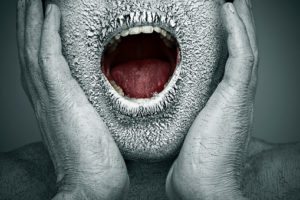
When your mouth doesn’t make enough saliva, your mouth can become dry and cause you discomfort. Understanding dry mouth and what causes it is important since it can lead to a host of dental problems.
What is dry mouth?
Dry mouth is the result of inadequate saliva flow in the mouth. Dry mouth can be cause by a variety of issues from medication use or other factors. Saliva production in the mouth helps with chewing and eating foods. Saliva also helps to coat the teeth and gums to protect them from bacteria and microbial overgrowth that might lead tooth decay.
Common cause of dry mouth
Dry mouth is often a side effect of medication use. Some examples of medications that can cause dry mouth are, antihistamines, decongestants, and blood pressure medications. Aside from medication, some medical conditions such as diabetes, stress, depression, and autoimmune disorders can lead to dry mouth. Dry mouth may also come from not drinking enough water.
Problems with untreated dry mouth
If dry mouth is left untreated, tooth decay and gum disease. Dry mouth does not just affect the gums or teeth, dry mouth can also cause problems with speaking, difficulty swallowing, and dry nasal passages. If you use dentures, dry mouth can make wearing dentures uncomfortable. Saliva helps coat the mouth and gums that acts as lubricant to make dentures comfortable when wearing.
Treating dry mouth
If you have dry mouth, there are many things you can do to treat dry mouth and improve dental hygiene. Some things you can do at home remedy dry mouth may include:
- Use sugar free gum or mint that contains xylitol. The chewing actions can help with saliva production.
- Brush and floss twice a day. Dry mouth can increase the microbes and bacteria buildup on your teeth and gums. Brushing and flossing can remove plaque buildup on teeth and get rid of food debris.
- Stay hydrated. When your hydrated, your mouth will naturally produce saliva.
- Dry mouth gel. This type of gel helps relieve pain and discomfort from dry mouth.
If you suffer from dry mouth, you should visit your dentist. When you visit your dentist, he may be able to determine the cause of your dry mouth and recommend the proper treatment. They can prescribe medications to help with dry mouth. Your healthcare provider can suggest products or lifestyle changes that can help control dry mouth.
If you have questions about dry mouth and how it affects your dental health, give California Dental Group a call at 800-407-0161 to schedule your appointment.

